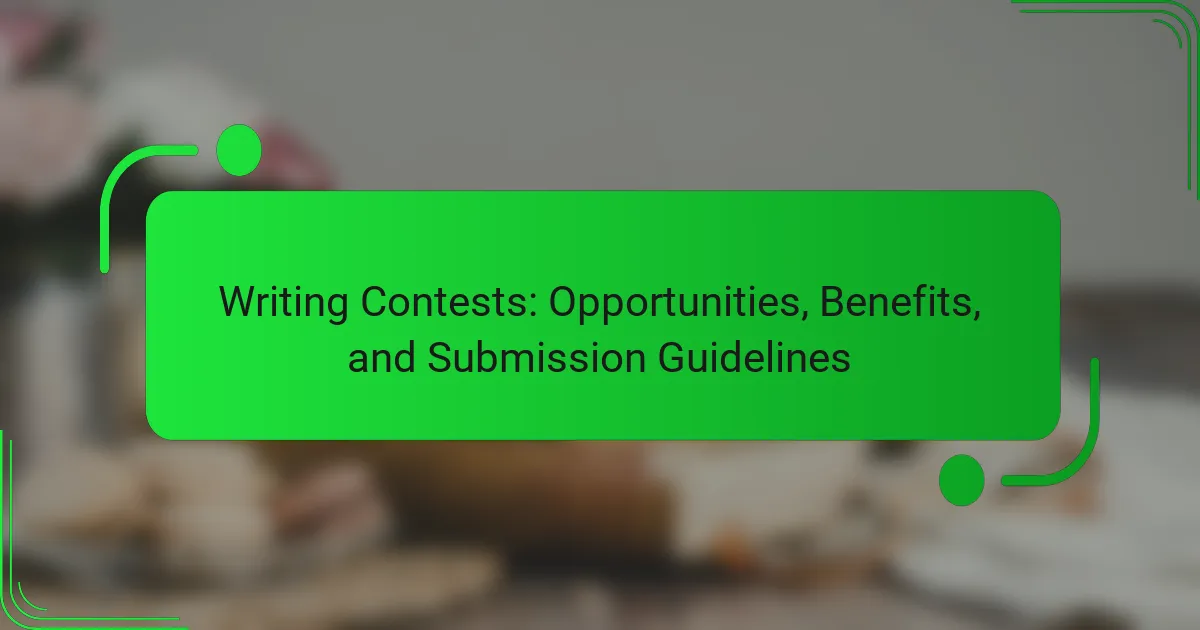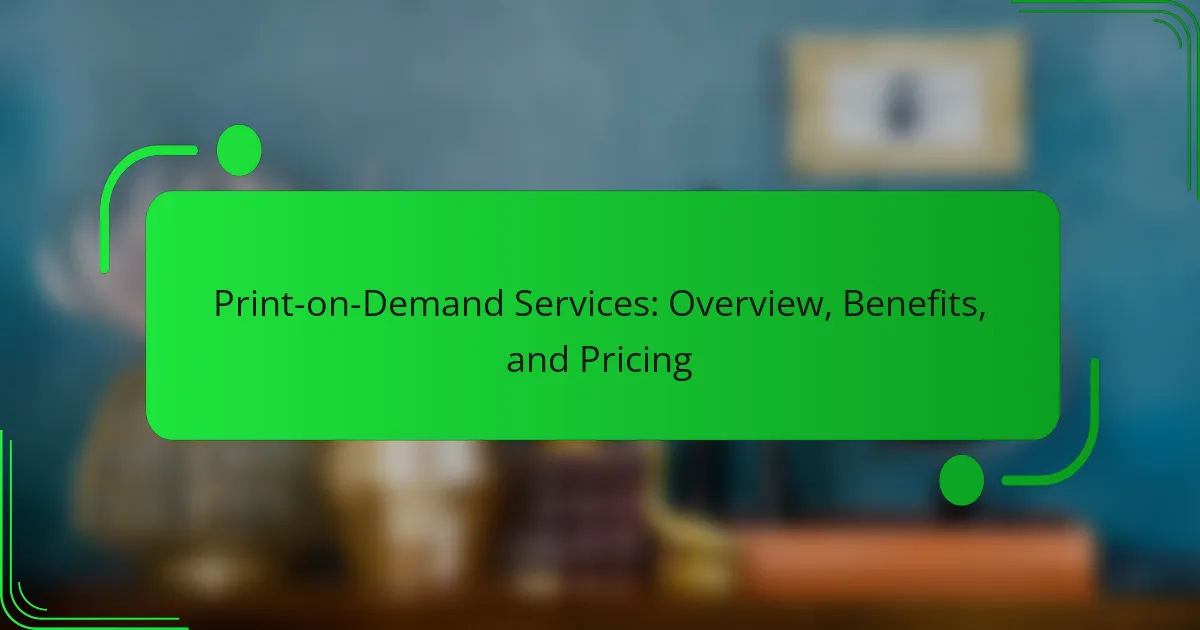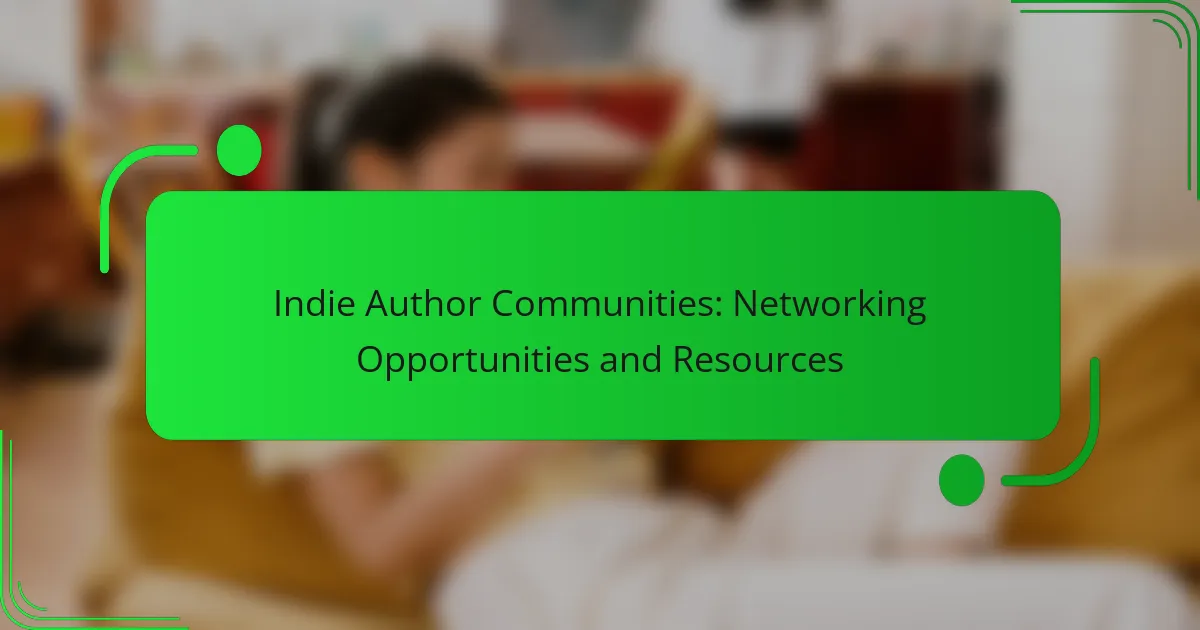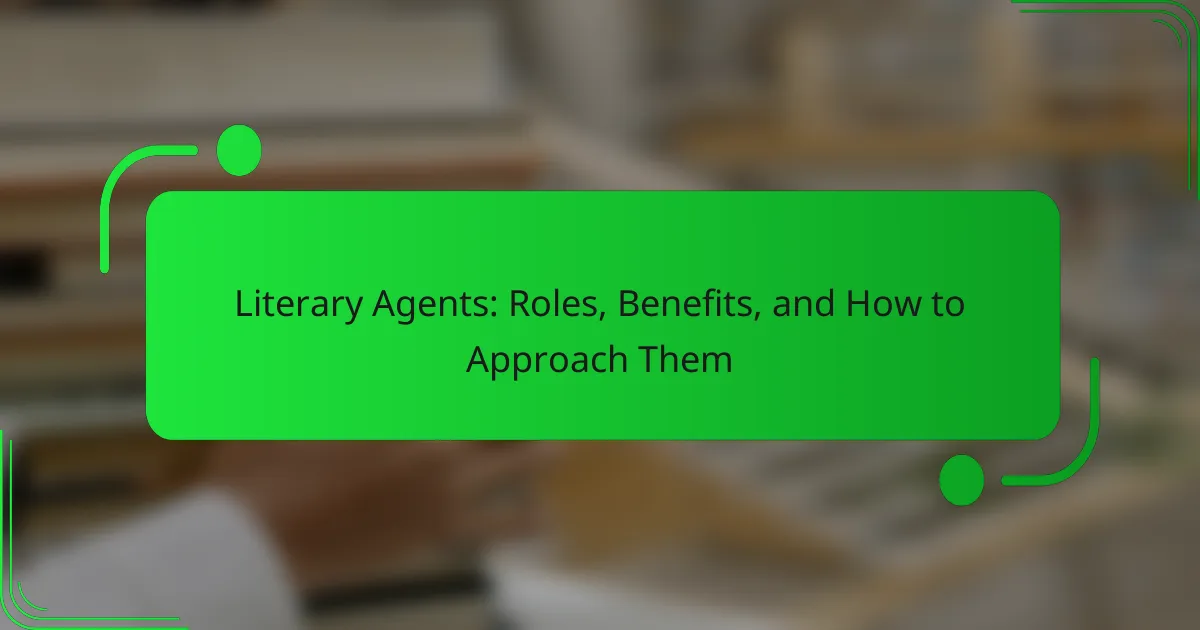Indie authors often struggle with visibility and audience engagement in a competitive market. Effective marketing strategies include leveraging social media, building an author website, and utilizing email marketing. Case studies highlight successful techniques, such as targeted advertising and content marketing, that can significantly boost book sales. Understanding audience demographics and engaging with readers through innovative promotional tools is crucial for success.
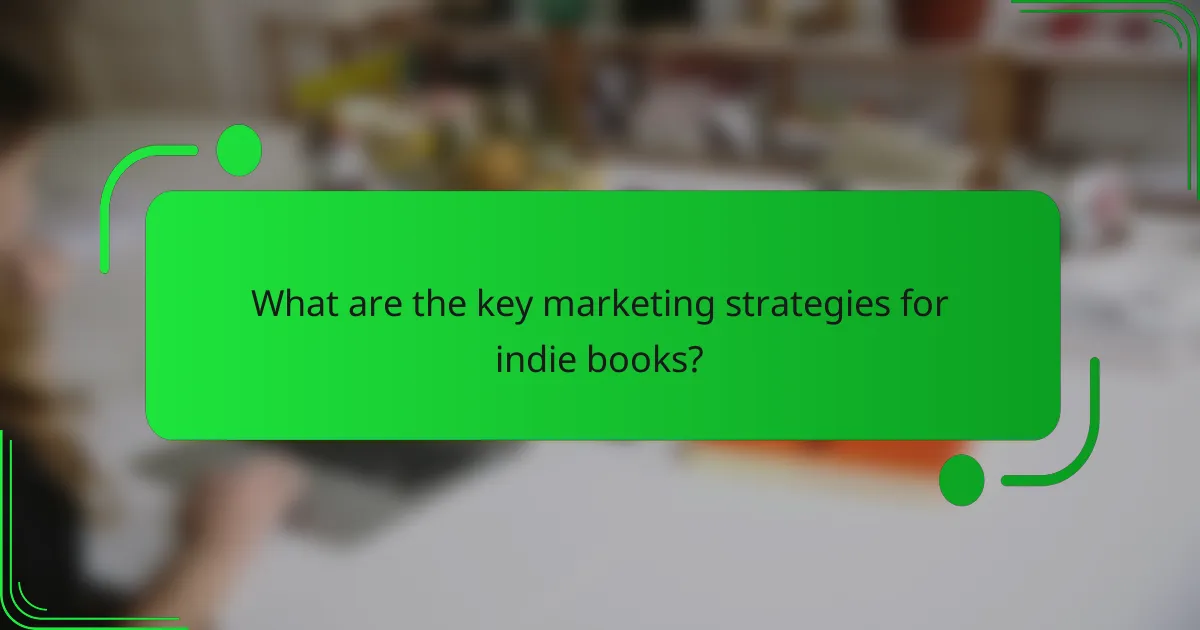
What are the key marketing strategies for indie books?
Effective marketing strategies for indie books include leveraging social media, building an author website, engaging with readers through newsletters, and utilizing book promotion services. These approaches enhance visibility and foster community.
Social media platforms like Instagram and Twitter allow authors to connect with potential readers. An author website serves as a central hub for information, showcasing books and providing updates. Newsletters keep readers informed about new releases and events, creating a loyal following. Book promotion services can amplify reach through targeted advertising.
Case studies demonstrate success through these strategies. For example, an indie author increased sales by 300% after implementing a social media campaign. Another author saw significant growth in newsletter subscribers after offering exclusive content.
In conclusion, a combination of these strategies tailored to the target audience can lead to successful marketing for indie books.
How can social media enhance visibility for indie authors?
Social media can significantly enhance visibility for indie authors by providing platforms for direct engagement with readers. Authors can leverage social media to share insights, build a community, and promote their work effectively.
Indie authors can utilize various strategies on social media. They can create engaging content, such as behind-the-scenes looks at their writing process, to attract followers. Regular interaction with fans through comments and messages fosters loyalty and encourages word-of-mouth promotion.
Platforms like Instagram and TikTok are particularly effective for visual storytelling, allowing authors to showcase book covers and share short readings. Utilizing hashtags relevant to their genre can increase discoverability.
Collaborating with other authors or influencers can amplify reach. Joint promotions or guest posts can introduce indie authors to new audiences, enhancing their visibility and potential readership.
Which platforms are most effective for indie book promotion?
Social media platforms, author websites, and email marketing are most effective for indie book promotion. These channels allow direct engagement with readers and targeted outreach.
1. Social Media: Platforms like Facebook, Instagram, and Twitter enable authors to build communities and share content.
2. Author Websites: A dedicated site serves as a central hub for information, reviews, and sales.
3. Email Marketing: Newsletters keep readers informed about new releases and promotions, fostering loyalty.
4. Book Promotion Sites: Websites like BookBub and Goodreads help reach wider audiences through targeted advertising.
5. Virtual Events: Online book launches and readings create interactive experiences that attract potential readers.
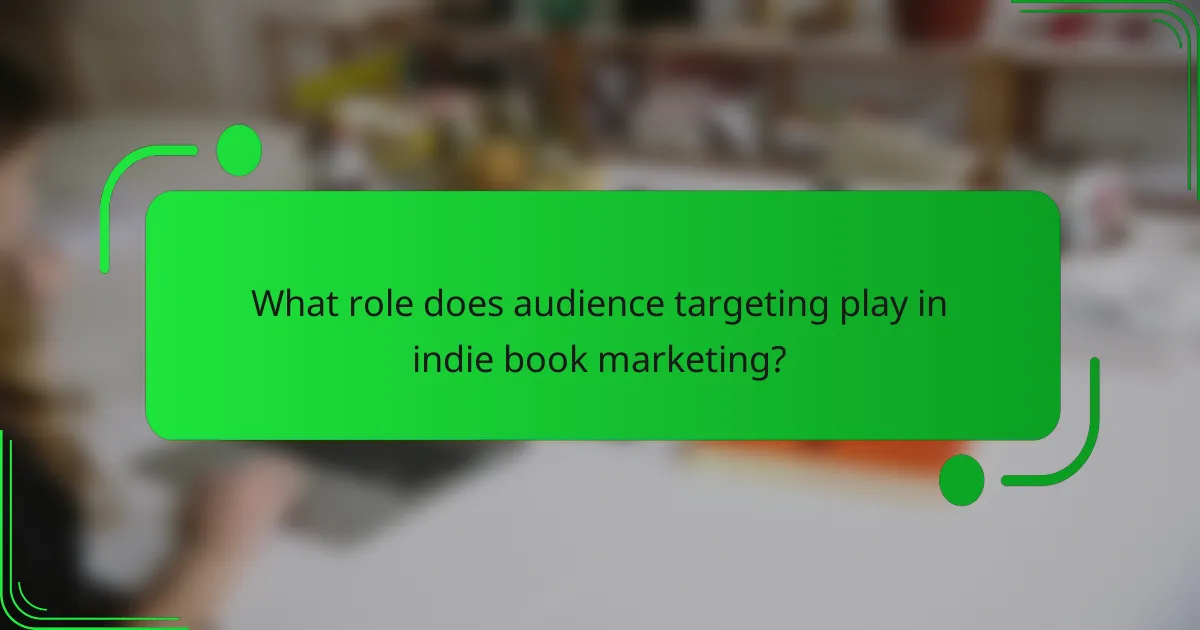
What role does audience targeting play in indie book marketing?
Audience targeting is crucial in indie book marketing as it maximizes outreach and engagement. By identifying specific reader demographics, authors can tailor their messaging and promotional strategies. This focused approach enhances the effectiveness of marketing efforts, leading to higher conversion rates. For instance, targeting genre-specific communities on social media can yield better results than broad campaigns. Additionally, utilizing data analytics helps refine audience profiles, ensuring that marketing resources are allocated efficiently. This strategic alignment between audience and content increases the likelihood of book sales and reader loyalty.
How to identify and engage your target readership?
To identify and engage your target readership, analyze demographics, preferences, and reading habits. Utilize social media insights, surveys, and book clubs to gather data. Tailor your marketing strategies based on this information to create effective outreach. Consider unique attributes like genre-specific interests to enhance engagement.
What are the best practices for building an author brand?
To build a strong author brand, focus on consistency, authenticity, and engagement. Establish a clear voice and visual identity across platforms. Share personal stories to connect with readers emotionally. Utilize social media and newsletters to maintain regular communication. Collaborate with other authors and influencers to expand reach.
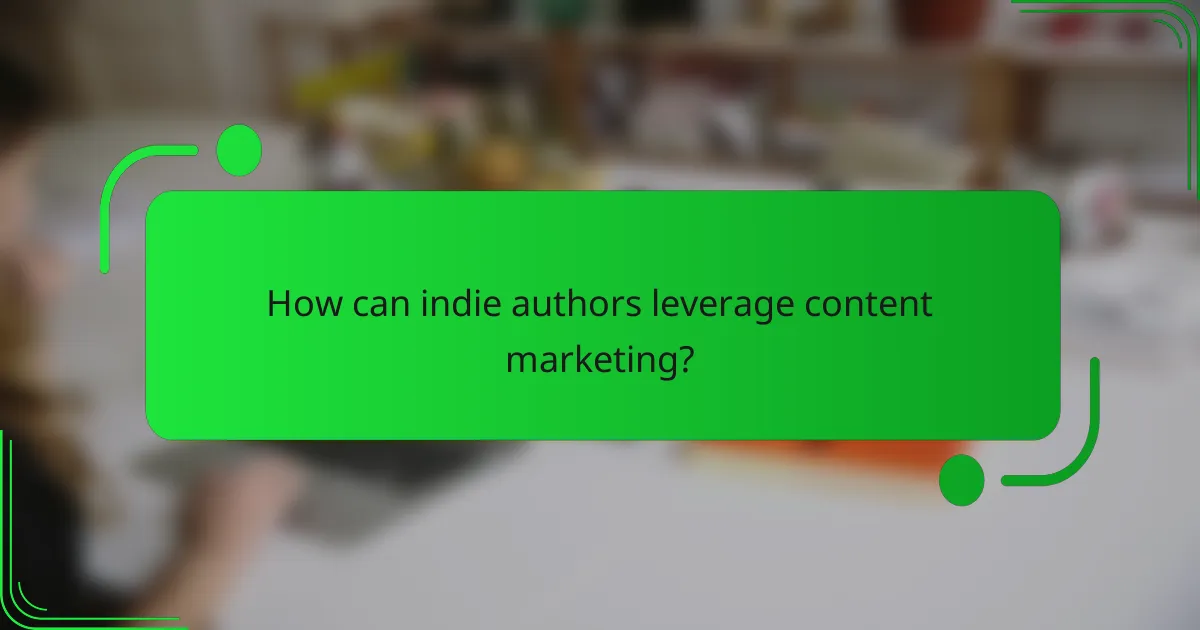
How can indie authors leverage content marketing?
Indie authors can effectively leverage content marketing by creating engaging, relevant content that resonates with their target audience. They can utilize blogs, social media, and email newsletters to share insights, behind-the-scenes stories, and updates about their work.
1. Develop a content calendar to plan and schedule posts consistently.
2. Use SEO techniques to optimize content for search engines, increasing visibility.
3. Engage with readers through interactive content like polls or Q&A sessions.
4. Collaborate with other authors or influencers to expand reach.
5. Analyze metrics to understand what content performs best and refine strategies accordingly.
What types of content resonate with readers?
Engaging content types for indie books include personal narratives, expert interviews, and informative guides. These formats resonate due to their ability to connect emotionally and provide value. Case studies showcasing successful marketing strategies also attract readers by illustrating practical applications. Utilizing visual content, such as infographics, enhances engagement and aids in information retention.
How to create a successful blog or newsletter for book promotion?
To create a successful blog or newsletter for book promotion, focus on building an engaged audience. Start by identifying your target readers and tailoring content to their interests.
1. Define your niche: Choose a specific genre or theme to attract a dedicated readership.
2. Create valuable content: Share insights, reviews, and writing tips that resonate with your audience.
3. Use social media: Promote your blog or newsletter through platforms where your audience is active.
4. Engage with readers: Encourage feedback and discussions to foster community.
5. Collaborate with authors: Partner with other writers for guest posts or joint promotions to expand reach.
These strategies can enhance visibility and drive interest in indie books.
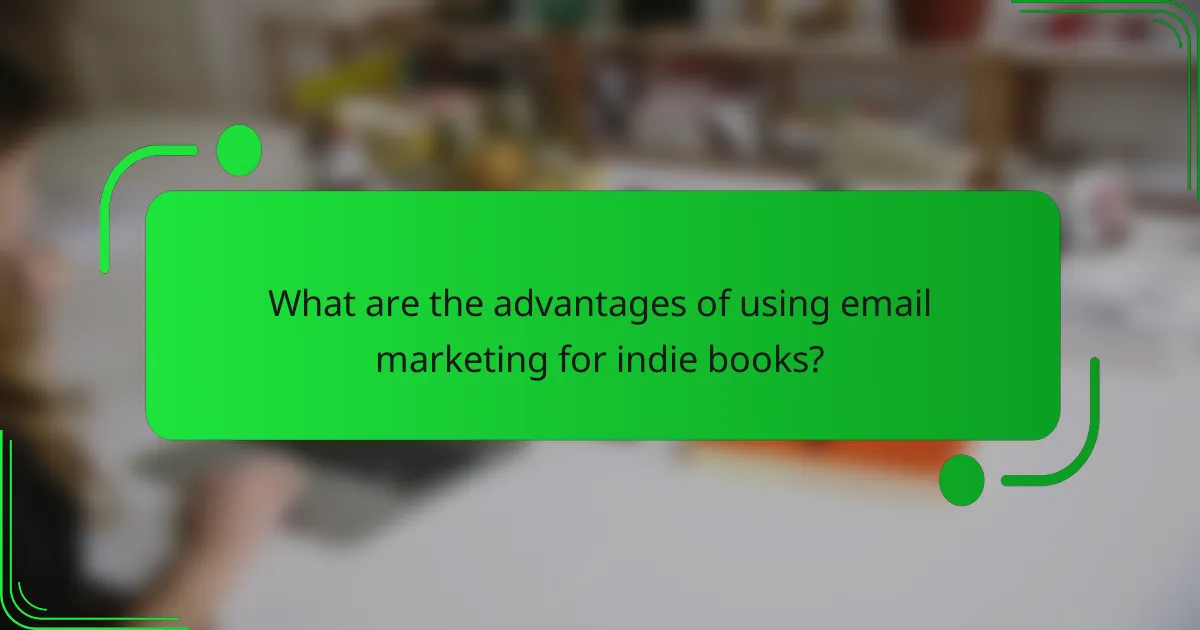
What are the advantages of using email marketing for indie books?
Email marketing offers significant advantages for indie books, including direct audience engagement, cost-effectiveness, and measurable results. It allows authors to build a loyal reader base by sharing updates, promotions, and personalized content. Additionally, email campaigns can lead to higher conversion rates compared to social media, as subscribers are often more interested in the content. Furthermore, the ability to segment audiences enhances targeting, ensuring that messages resonate with specific reader interests. Overall, email marketing fosters stronger connections between indie authors and their readers, promoting sustained interest and sales.
How to build and maintain an email list effectively?
To build and maintain an email list effectively, focus on targeted strategies that engage readers. Start by offering valuable content, such as exclusive excerpts or insights, to attract subscribers. Use sign-up forms on your website and social media platforms to capture leads. Regularly send newsletters with updates and promotions to keep your audience engaged. Analyze open and click rates to refine your approach and improve retention.
What strategies can improve email open and click-through rates?
To improve email open and click-through rates, focus on compelling subject lines and targeted content. Personalization increases engagement, so use the recipient’s name and tailor messages to their preferences. A/B testing subject lines helps identify what resonates best. Segment your audience to send relevant content, which boosts interest. Optimize send times based on analytics to reach recipients when they are most likely to engage.
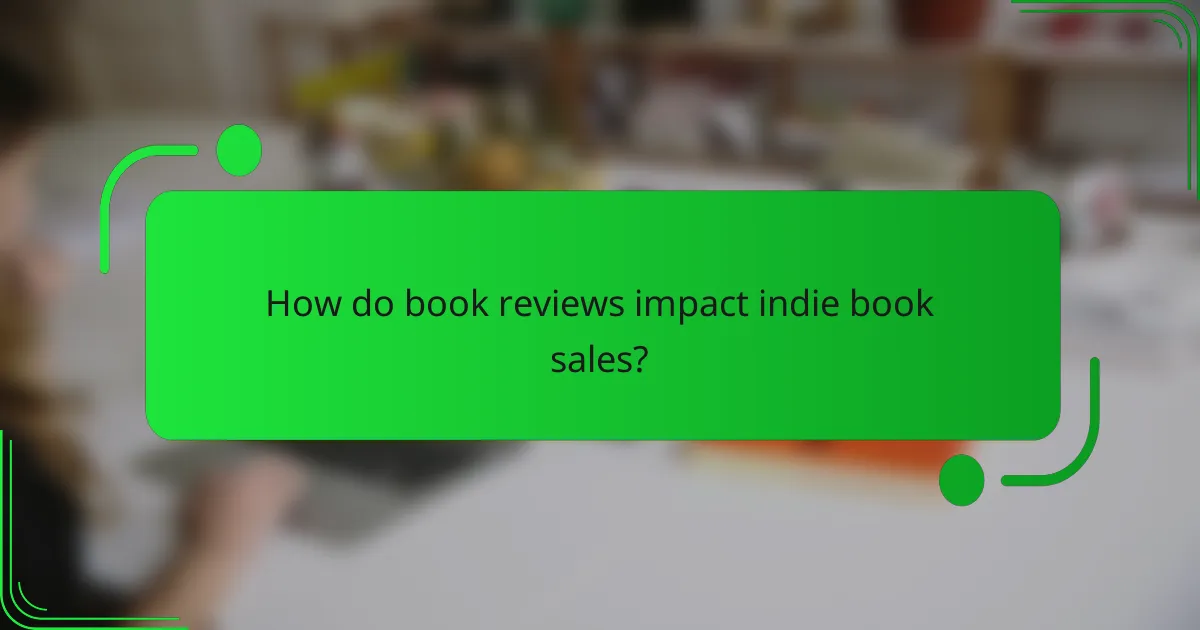
How do book reviews impact indie book sales?
Book reviews significantly boost indie book sales by enhancing visibility and credibility. Positive reviews attract potential readers, increasing purchase likelihood. They serve as social proof, influencing buyer decisions. According to a survey, 70% of readers trust online reviews as much as personal recommendations. Engaging with reviewers can create a loyal community, further promoting sales.
What are the best methods for acquiring book reviews?
The best methods for acquiring book reviews include leveraging social media, engaging with book bloggers, and utilizing reader services. Social media platforms allow authors to connect directly with readers, encouraging them to share their reviews. Collaborating with book bloggers can provide access to dedicated audiences, increasing visibility. Reader services like Goodreads and NetGalley facilitate review requests from active readers, amplifying feedback.
How to handle negative reviews constructively?
To handle negative reviews constructively, respond promptly and professionally. Acknowledge the feedback, express gratitude, and offer solutions. This approach can enhance your brand’s reputation and foster customer loyalty.
1. Acknowledge the review to show you value customer opinions.
2. Respond promptly to demonstrate commitment to customer satisfaction.
3. Maintain a professional tone, avoiding defensiveness.
4. Offer solutions or alternatives to address the concerns raised.
5. Encourage further dialogue to resolve issues privately.
6. Learn from the feedback to improve future offerings.
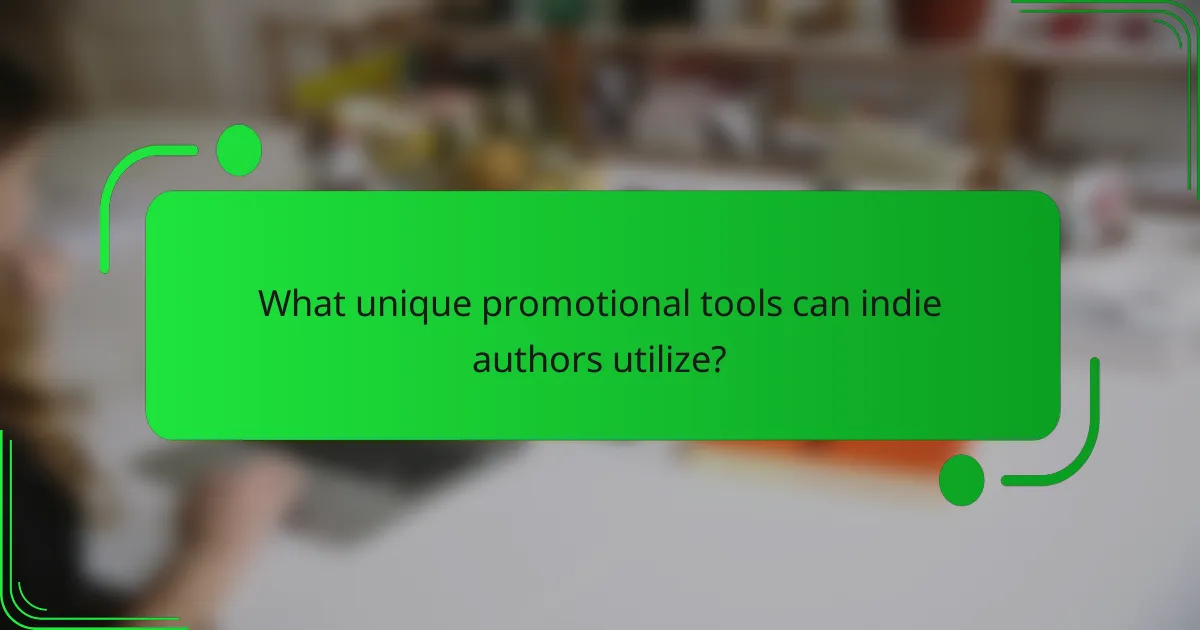
What unique promotional tools can indie authors utilize?
Indie authors can utilize unique promotional tools such as social media giveaways, book trailers, and targeted email campaigns. These strategies effectively engage readers and build a loyal audience. Social media giveaways create buzz and increase visibility. Book trailers visually showcase the book’s themes and tone, appealing to potential readers. Targeted email campaigns allow authors to connect directly with interested readers, offering exclusive content or promotions.
How do book trailers influence reader interest?
Book trailers significantly enhance reader interest by providing a visual and emotional preview of the story. They engage potential readers through dynamic storytelling, showcasing characters and settings. Research indicates that videos can increase conversion rates by up to 80%. Additionally, book trailers can be shared across social media platforms, expanding reach and visibility. Effective trailers often highlight unique attributes of the book, such as its genre or themes, which can resonate with target audiences.
What role do giveaways and contests play in marketing?
Giveaways and contests significantly enhance marketing by increasing engagement and broadening audience reach. They create excitement around indie books, encouraging participation and sharing among potential readers.
These strategies often lead to increased visibility on social media platforms, fostering community interaction. For example, successful contests can generate user-generated content, which serves as authentic promotion.
Additionally, giveaways provide valuable data on audience preferences and behaviors, assisting in targeted marketing efforts. As a result, indie authors can refine their strategies to better meet reader interests.
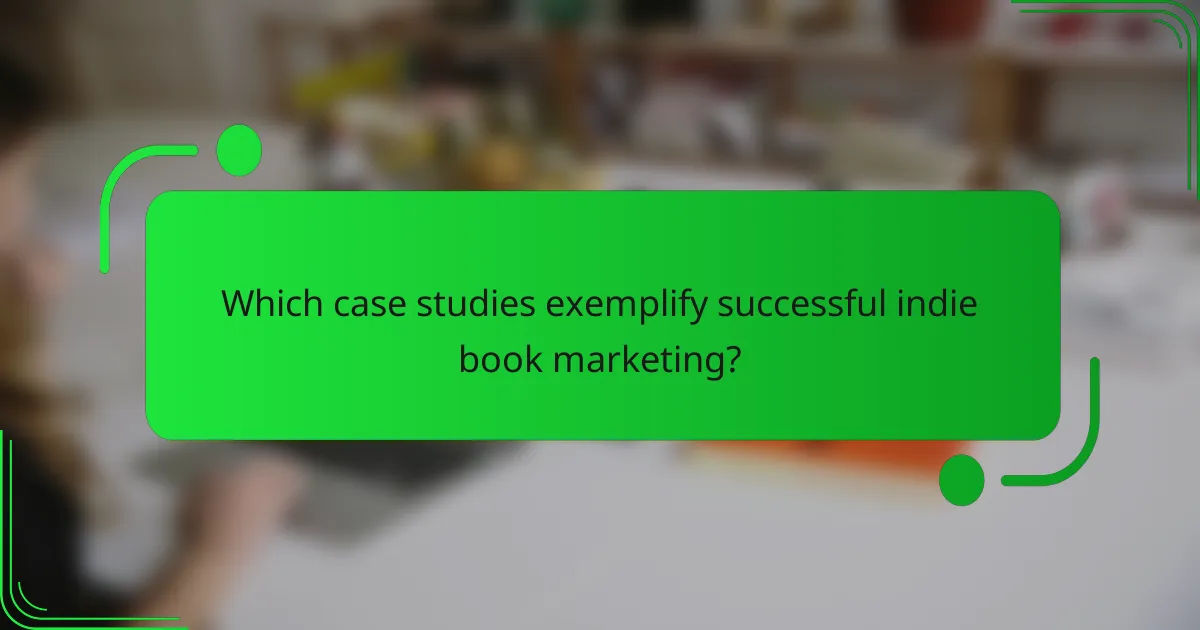
Which case studies exemplify successful indie book marketing?
Successful indie book marketing is exemplified by case studies that showcase innovative strategies and measurable results.
One notable example is the marketing campaign for “The Martian” by Andy Weir. Initially self-published, Weir utilized social media and reader engagement to build a following. His strategic use of platforms like Reddit allowed him to connect directly with potential readers, leading to increased sales and eventual acquisition by a major publisher.
Another case is “Wool” by Hugh Howey. Howey’s approach involved releasing the book in serialized format, which created anticipation and sustained reader interest. He effectively leveraged Amazon’s Kindle Direct Publishing platform, utilizing promotional tools to boost visibility and sales, resulting in significant revenue and a strong fan base.
Additionally, “The Silent Patient” by Alex Michaelides demonstrates success through targeted advertising. The author employed Facebook ads to reach specific demographics, resulting in rapid sales growth and widespread recognition. This targeted approach illustrates the effectiveness of data-driven marketing in the indie publishing space.
These case studies highlight the importance of innovative marketing strategies, reader engagement, and data utilization in achieving success for indie authors.
What can be learned from successful authors in different regions?
Successful authors across different regions emphasize diverse marketing strategies tailored to their local audiences. They utilize social media, engage with communities, and leverage unique cultural elements in their promotions.
For example, authors in North America often focus on online platforms like Goodreads and Bookstagram, while those in Europe may prioritize literary festivals and local bookshops. Case studies reveal that successful indie authors adapt their techniques based on regional preferences, such as using regional dialects in marketing materials to resonate with local readers.
Additionally, successful authors often collaborate with local influencers to enhance visibility and credibility. This approach not only builds their brand but also fosters a sense of community around their work.
How did specific indie books achieve bestseller status?
Indie books achieve bestseller status through targeted marketing strategies such as social media engagement, email newsletters, and leveraging book review platforms. Successful case studies highlight the effectiveness of building an author brand and creating a community around the book. For instance, one indie author used a strategic launch plan that included a pre-release campaign, resulting in significant early sales. Another example showcases the impact of collaborating with influencers to reach wider audiences. These techniques not only enhance visibility but also foster reader loyalty, crucial for sustained success.
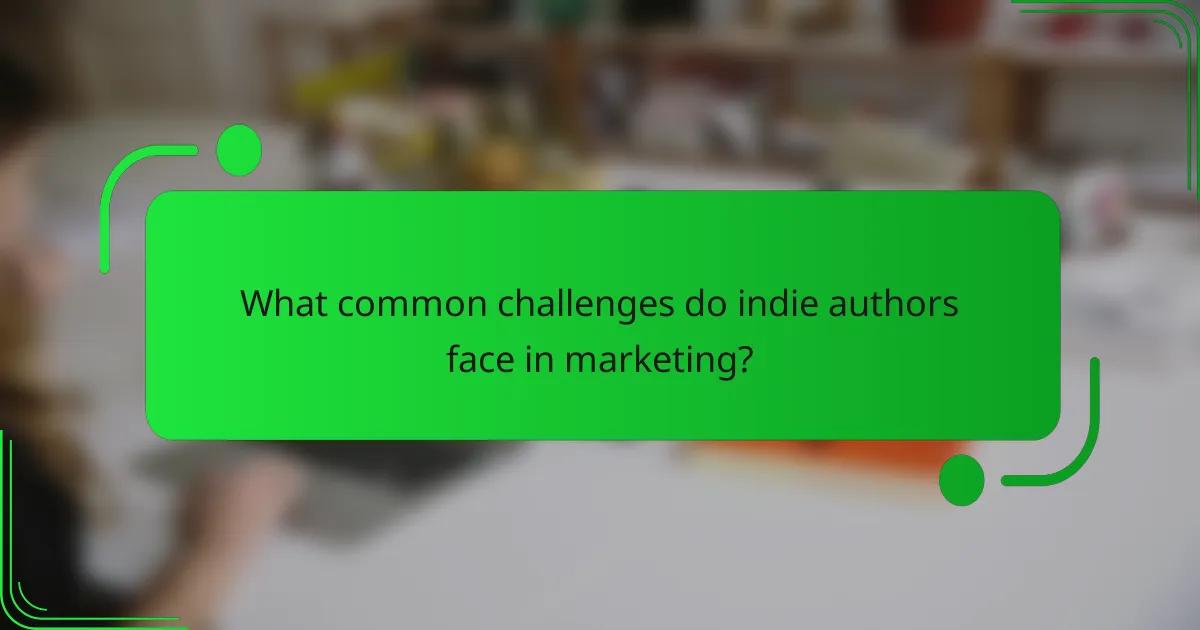
What common challenges do indie authors face in marketing?
Indie authors face several common challenges in marketing their books. Limited budgets hinder effective advertising, while lack of visibility makes it hard to reach potential readers. Building an author platform requires time and effort, which can distract from writing. Additionally, navigating social media algorithms complicates audience engagement. Finally, competition from established authors poses a significant barrier to gaining market share.
How to overcome budget constraints in promotion?
Utilize creative and low-cost marketing tactics to overcome budget constraints in promotion. Focus on leveraging social media platforms, engaging with local communities, and utilizing email marketing to reach your audience effectively. Collaborate with influencers or other authors for cross-promotion, and consider hosting virtual events to maximize outreach without significant costs. Implementing targeted content marketing strategies can also yield high returns with minimal investment.
What are the pitfalls to avoid in indie book marketing?
Indie book marketing pitfalls include neglecting audience research, underestimating social media, and avoiding professional help. Failing to identify target readers can lead to ineffective strategies. Social media platforms are vital for engagement and visibility. Lastly, not investing in professional editing or cover design can diminish credibility and appeal.
What expert tips can enhance your indie book marketing strategy?
To enhance your indie book marketing strategy, focus on building an authentic online presence and engaging with your audience. Utilize social media platforms effectively, emphasizing visual content and storytelling. Collaborate with other authors and influencers to expand your reach. Implement email marketing to maintain direct communication with readers, offering exclusive content and updates. Leverage book promotion sites and consider targeted ads to boost visibility. Analyze metrics to refine your approach continuously.
